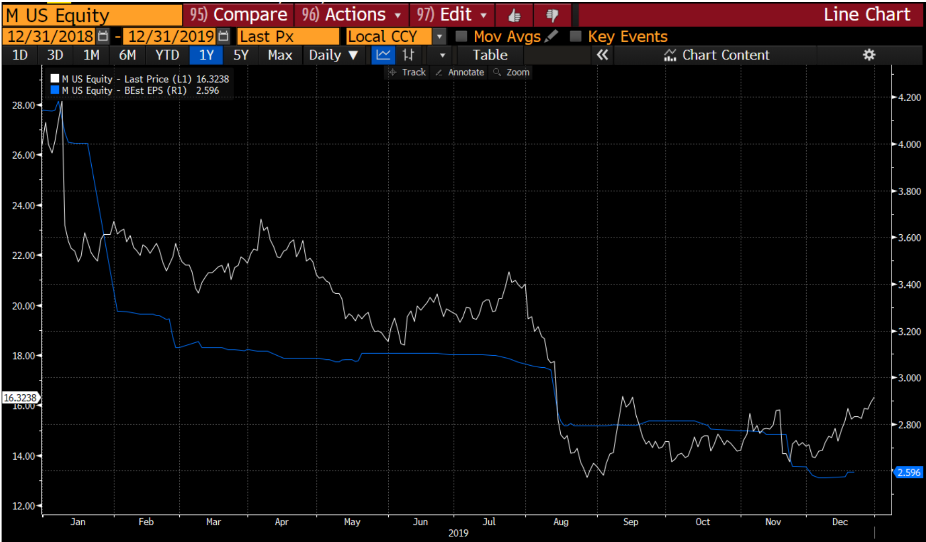Don’t Fall into a Value Trap!
The core tenet of many value investing strategies is often mean reversion. Simply put, this is when managers bet that bad things will improve – that the poor fundamentals of a company won’t last. During a period of volatility and depressed asset prices, you can buy the stock at a discount – a large “margin of safety” in the words of the iconic value investor, Benjamin Graham.
This approach potentially brings profits to the investor who had faith during the storm. So, in a sense, value investing can be seen as forecasting things being less bad than feared. How companies often get there and bounce back is mean reversion. Poor sales revert back to the mean, or weak margins return closer to their longer-term average. It basically is the belief that things are generally more likely to go back to normal, than get worse.
But what happens if fundamentals don’t mean revert? This is called a value trap. Investors often fall prey to value traps when they go hunting for a bargain. These “bargain” stocks may appear promising, but given the market is a forward-looking mechanism, it may realize, before you do, that in actuality, fundamentals are broken.
What we have realized is that companies that have been trading at low multiples of earnings, cash flow or even book value for an extended period of time are sometimes doing so for valid reason – because they have little promise – they are unable to adapt to the current environment.
Mean reversion doesn’t always work (It hasn’t worked in the past decade) – plus it is very difficult to properly execute. An investor has to be correct twice to have success in this trade – both on the purchase and the sale price. It is a natural human bias to bet on reversals, but it can be a psychological trap – witness your own betting tendencies if you are observing a roulette game where black comes up 10 times in a row and then asked to wager on red or black.
As a case in point, take a recently popular “classic value stock” such as Macy’s (M). Without going into the various cyclical and fundamental reasons for its decline in this example, we can highlight a simple fact. In January 2019, M was trading at an 6x forward P/E multiple which was viewed, by some, as very cheap (relative to the market multiple of ~18x P/E) with a high margin of safety. At that time, consensus earnings estimates were expected to be ~$4.20 per share in 2019. By mid-August, M stock price was 50% lower but earnings were now expected ALSO to be 34% lower. This value stock turned out to be far riskier than many “expensive” growth stocks which are rapidly growing earnings and cash flows.

Source: Bloomberg
In an environment where valuations may not matter, such as what we are seeing now, investors need to use every arrow in their quiver to fundamentally analyze a stock. Contrary to popular belief, we believe valuing a stock is not just a binary outcome of cheap or expensive – and most certainly should not be the main driver of your thesis. Its much more than that.
People would look at you funny if you purchased a home solely because it appeared cheap – purchasers need to carefully examine the house by looking at the foundation, construction quality, rental yields, potential improvements and price comparisons on the street, neighborhood or other cities.
Most importantly, stocks need catalysts in order to grow earnings and its multiple – the market’s way of gauging investor sentiment for the company. A company’s history should never be overlooked, and it should be compared to what the company’s current financial statements look like.
If the company cannot improve upon its position operationally, it may have trouble competing with companies that can. If a company doesn’t have new products on the horizon or expects to show revenue/earnings growth, consider avoiding it, as its historical valuation metrics may never revert back to the mean, losing you lots of money.
Bottom line…don’t forget that the future “E” is ultimately a main driver of what makes the “P” move!
Disclosures
Past performance is not indicative of future results. This material is not financial advice or an offer to sell any product. The information contained herein should not be considered a recommendation to purchase or sell any particular security. Forward looking statements cannot be guaranteed.
This commentary offers generalized research, not personalized investment advice. It is for informational purposes only and does not constitute a complete description of our investment services or performance. Nothing in this commentary should be interpreted to state or imply that past results are an indication of future investment returns. All investments involve risk and unless otherwise stated, are not guaranteed. Be sure to consult with an investment and tax professional before implementing any investment strategy. Investing involves risk. Principal loss is possible.
Advisory services offered through Aptus Capital Advisors, LLC, a Registered Investment Advisor (RIA) registered with the Securities and Exchange Commission and headquartered in Fairhope, Alabama. Registration does not imply a certain level of skill or training. More information about the advisor, and its investment strategies and objectives, is included in the firm’s Form ADV, which can be obtained, at no charge, by calling (251) 517‐7198. ACA-20-118.



